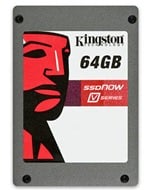It seems more and more people are using Solid State Drives (SSD’s) than ever before. Part of that is because the price has finally started to come down to a reasonable level and if you do some shopping for deals you can find SSD’s at about $1 per gigabyte.
SSD’s, sometimes referred to as flash based drives, have no moving parts which means access to your stored data is sped up significantly when it is stored on an SSD.
The knock on SSD’s that have kept them from truly becoming more mainstream in our laptop and desktop systems is the price. The deals I mentioned above at about $1 per gigabyte have only recently started to become more common. When SSD’s were first making their entry into the consumer market it was not uncommon to see those drives priced two or three times that amount.
Bottom line is as those price points start to shrink on the price per gigabyte of storage then SSD’s are going to become even more common place in computers across all brands and operating systems.
So the reason for the background above is to set up the fact that taking care of SSD’s is quite different then tweaking our spinning hard drives that have all the moving parts. In a typical spinning hard drive data access is sequential so the less fragmented your hard drive is the quicker that access is. Features have been added to Windows over the last couple of versions to help speed that process up and put the data and programs you access more frequently on the drive so that it can be read quicker or use caching in memory to increase the access speeds.
If you put an SSD in a Windows 7 based machine two of these utilities will be disabled on that drive – Defragmenter and SuperFetch. The reason they are disabled is because Windows recognizes that drive as an SSD which does not require defragging or caching to speed up the access since it is fast already based on its flash memory speeds.
In discussions with my friends over at Raxco Software, the developers of PerfectDisk, there is one area of that SSD drive that can use attention though and help with SSD performance – the free space.
SSD Optimize is an optimization method for SSDs that focuses on free space consolidation without defragmentation of files. Solid State Drives are not affected by file fragmentation like traditional electromechanical disk drives. As such, it will leave files in a fragmented state while consolidating free space into large pieces.
I have now been using this feature in PerfectDisk 12 for a few weeks now and it has helped my system stay very fast with its SSD drive and kept free space fragmentation under control.
So in conjunction with Raxco and PerfectDisk12 we are having a giveaway on the site for three free licenses for PerfectDisk 12 which is a $30 value each. I want you to be able to experience the benefits of PerfectDisk whether you have an SSD or not. All you have to do is comment on this blog entry and let us know the current tool you use for defragging your hard drives and why your using it.
Entries will be accepted until 21 October and only one entry per person is allowed.
Visit the PerfectDisk 12 Product Page for more info and list of features.


